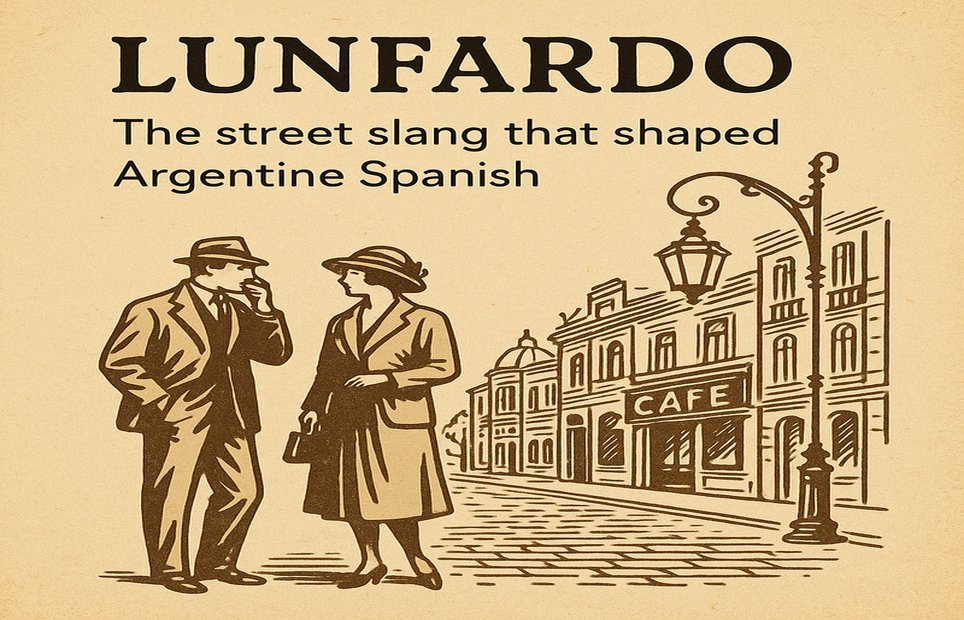Lunfardo: The Slang of Buenos Aires

Argentine Spanish is peppered with words and phrases from Lunfardo, a colorful and ever-evolving slang born on the streets of Buenos Aires in the second half of the 19th century. What began as a secret code among criminals, gamblers, and other shady characters, has grown into one of the most distinctive linguistic hallmarks of Argentine […]
Lunfardo: what do “garpar” and “garpe” mean?
One of the most interesting features of Lunfardo – an Argentine dialect of Spanish that arose in the late 19th century among petty criminals living with immigrants and native Argentines in the sheet metal tenements of lower-class Buenos Aires neighborhoods – is its great capacity for metathesis, the re-arrangement of sounds or syllables in a […]
Italianisms in Lunfardo – Part II
Continuing on with our last article, on Italianisms in the Lunfardo dialect, which originated in working class districts in Buenos Aires in the late 19th century, below are several more interesting Lunfardo words. Mistongo (from mishio, an Italianism derived from the Genovese miscio) -The original Genovese word meant “without money” and has generalized to include […]
Italianisms in Lunfardo – Part I
The Lunfardo dialect of Spanish arose in the last quarter of the 19th century among petty criminals living with immigrants and native Argentines in the conventillos – sheet metal tenements – of lower-class neighborhoods in Buenos Aires. Because so many of these immigrants (some ten million between 1821 and 1932) were poorly educated or illiterate […]
Croqueta, azotea and coco: Some lunfardo words for head
Lunfardo is a rich and often slyly humorous dialect, and nowhere is its imaginative use of language more evident than with the plethora of words it has for “head” (cabeza in standard Spanish). As can be expected, many of these terms are related to its shape: coco – coconut mate – the hollowed-out gourd used […]
Everyday Lunfardo Expressions Used in Buenos Aires
Much has been said and discussed about lunfardo: its origins, the way it has been introduced in some of the most popular tango songs sang by porteños in Buenos Aires…This has led many people to think that lunfardo is a dialect that is not currently used when this is actually not the case. There are […]
Cancha and Canchero – just what do they mean?
Argentina is a country which has been influenced by the castilla language of the first Spanish colonialists and the indigenous languages spoken by the native Indians – a mixture of Quichua, Guaraní and Mapuche, depending on the region of the country you might happen to be referring to. The rich mixture of violently opposed heritages, […]
“Agarrate Catalina”: What does it mean and where does it come from?
“Agarrate, Catalina,” is another widely-used, Argentine lunfardo expression, probably dating back to the 1940s and the story of a young circus artist called, Catalina. The legend describes the young Catalina as one of the youngest members of a family of trapeze artists in a circus which used to frequent the Porteño neighborhoods of Buenos Aires […]
Lunfardo favorites: what Argentine women just love to say!
Argentine Spanish, or “Castellano,” differs to the more “neutral” forms of Spanish, found in Bolivia or Perú for example, in that it incorporates a distinctive kind of verb conjugation in the second person singular. It’s also crammed to the brim with phrases taken from “Lunfardo;” a dialect developed by working class Porteños (natives to Buenos […]
Ñoqui in Argentina is more than just an Italian meal
Ñoquis might be a popular Italian dish in Argentina, particularly in Buenos Aires, but its meaning goes a lot deeper than Italian gastronomy. In Argentine lunfardo, ñoquis is the word used to refer to someone who doesn’t work, but who still manages to claim a salary at the end of the month. The […]



